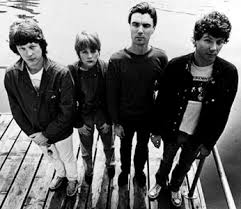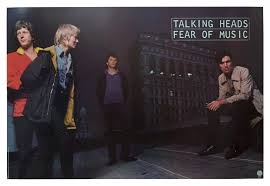Fear of Music
| Talking HeadsFear of Music
Fear of Music is the third studio album by American rock band Talking Heads, released on August 3, 1979 by Sire Records. It was recorded at locations in New York City during April and May 1979 and was produced by the quartet and Brian Eno. The album reached number 21 on the Billboard 200 and number 33 on the UK Albums Chart, and spawned the singles "Life During Wartime", "I Zimbra", and "Cities".
Fear of Music received favourable reviews from critics. Praise centred on its unconventional rhythms and frontman David Byrne's lyrical performances. The album is often considered one of the best Talking Heads releases, and has featured in several publications' lists of the best albums of all time. -Wikipedia
Critic Reviews
Show All-
 The Atlantic
The Atlantic
it encompasses punk and disco, aggression and passivity, paranoia and resolve, gleefully dancing its way off the brink.
-
 COS
COS
What makes Fear of Music such a perfect third album is that it both touches back on what was and lays the groundwork for what would be.
-
 Rolling Stone
Rolling Stone
Fear of Music is Talking Heads’ most elaborate production so far, teeming with overdubs and effects the group doesn’t try to reproduce in concert. Sounds emerge out of nowhere, echoes tangle the beat, instrumental timbres form unholy alloys.
-
 All Music
All Music
It's an uneven, transitional album, though its better songs are as good as any Talking Heads ever did.
-
 Ultimate Classic Rock
Ultimate Classic Rock
‘Fear of Music’ featured the smartest, strangest dance music ever released ... until the Heads’ next album.
-
 Treble
Treble
Fear of Music is a seemingly ironic title for an album so eclectic and awe-inspiriting. David Byrne once said “to shake your rump is to be environmentally aware.” And, appropriately enough, the overarching greatness of this album comes down to one simple phrase: it’s got a good beat and you can dance to it.
-
 Sputnik Music
Sputnik Music
A post punk classic that helped define the upcoming decade of new wave.
-
 Punk News
Punk News
just because it’s a transitional album doesn’t mean it’s not an excellent work in its own right, and there’s certainly a lot of joy to be derived from this album.
-
 Classic Rock History
Classic Rock History
Fear of Music was the point when Talking Heads began to seriously deepen their approach and expand their influence. Their third album showed what a talented, well-rounded and important band of their time that they really were.
-
 I Like Your Old Stuff
I Like Your Old Stuff
40 years since it’s 1979 release, Fear Of Music remains a timeless paradigm of mathematical musical mayhem; intertwining rhythm’s, propelled by stark, driving basslines, marching through a wash of dissonant soundscapes; punctuated by Byrne, obsessively trying to convince himself of something—what, we may never be sure.
-
 Albumism
Albumism
Talking Heads had its greatest success post-Fear of Music and recorded some of its best material, but there’s no question that their third album reflected the process of the band becoming a completely different animal.
-
 The Escapist
The Escapist
I wouldn't be ready to say it's better than Remain In Light, even if I feel it's a bit more organic, but it's a damn good contender. I understand everyone who thinks it's their best work.
-
 AOTY
AOTY
The 3rd album from Talking Heads shows how experimental the group could get, which would culminate in their next album "Remain in Light".
-
 WARR
WARR
I hate the band, and even I have to admit this is a great album.
-
 Peanut Butter Pope
Peanut Butter Pope
Honestly, Talking Heads are up there with Pink Floyd and The Beatles as a band with the most great albums. Particularly in their earlier run, they could do no wrong, and ‘Fear of Music’ is proof.
-
 Something Else
Something Else
Talking Heads’ Fear of Music opened up a world of art and sound for me.
-
 Mark Prindle
Mark Prindle
Some folks swear by this album, but I just hear boring atmospherics - and not even CATCHY atmospherics like that third Throbbing Gristle album, but really annoying and ugly atmospherics like that third basemen for the Seattle Mariners.
-
 Aphoristic Album Reviews
Aphoristic Album Reviews
Fear of Music is so consistent and compelling that it clearly ranks as their second best record.
-
 Stereogum
Stereogum
We leave with a disturbing map of what sounds like a total urban environment: air quality, transportation, news, drugs, nightlife, government, violence. It's just barely tempered with the sexy thrust of dance music (funk and disco most prevalently) and the occasional parroting of a bar ballad's chorus.
-
 The Student Playlist
The Student Playlist
As great and as distinct as their first two records were, Fear Of Music represented the point at which David Byrne and his colleagues began to develop a truly unique identity.
-
 Yahoo
Yahoo
What makes Fear of Music such a perfect third album is that it both touches back on what was and lays the groundwork for what would be.
-
 GQ
GQ
Turning 40 this year, Fear Of Music was Talking Heads’ album of accessible psychodrama. Put simply: jam after jam.



Rate This Album and Leave Your Comments